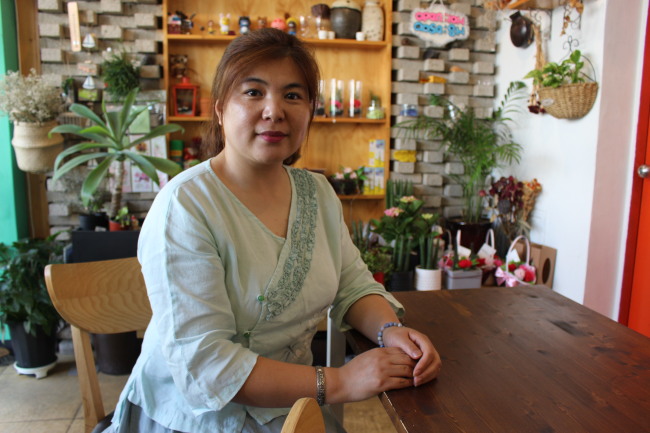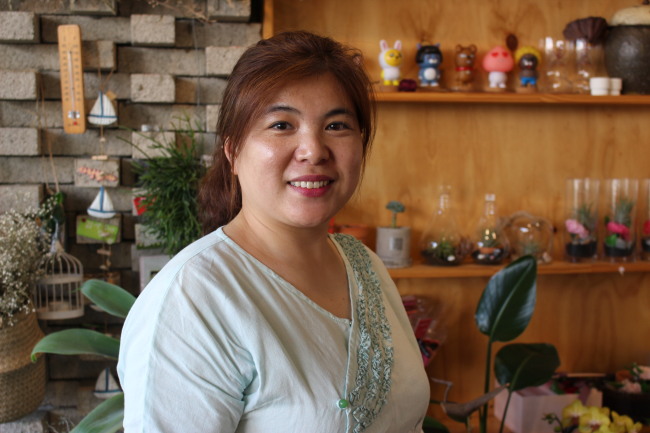[Herald Interview] ‘Migrant families should contribute to Korean society for equal share’
Naturalized citizen’s try at local politics and her message
By Jo He-rimPublished : May 14, 2018 - 17:14
Wang Kena, a naturalized Korean citizen who originally came from China, believes that in order for migrant families and individuals to have a voice in Korean society, it is important for them to contribute to society.
Working to improve awareness of migrant households and their children for the past five years, Wang ran for the ruling Democratic Party of Korea’s proportional representative seat in the Suwon City Council for the upcoming local and gubernatorial election slated for June 13.
While she did not make it on the party’s nomination list announced on May 7, Wang said it was a learning experience and that she would continue to do her part for society as a Korean citizen.
Working to improve awareness of migrant households and their children for the past five years, Wang ran for the ruling Democratic Party of Korea’s proportional representative seat in the Suwon City Council for the upcoming local and gubernatorial election slated for June 13.
While she did not make it on the party’s nomination list announced on May 7, Wang said it was a learning experience and that she would continue to do her part for society as a Korean citizen.

“I do not have political ambitions, but I personally learned a lot from the process -- applying for the party’s nomination, making a speech on my manifesto in debates and electioneering,” she said in an interview with The Korea Herald on May 8.
“I also learned that political capability may be innate, or it could be nurtured,” she said, adding that she is not sure if she will make another bid.
Wang serves as the chief of a migrant women’s association in Suwon, which she founded. She has been the head of the Jangan-gu district multicultural committee of the liberal Democratic Party since 2014.
Mom power
Wang came to Korea in 2002 to marry a Korean man she met in China. Three years later, she became a naturalized Korean citizen.
She is a mother of two -- a 16-year-old daughter and a son who is a year younger -- and it was her children that got her involved in social activities and volunteer work.
“When my son entered elementary school, he came home crying. I learned that other kids were teasing my son for having a Chinese mother, and he was called names and was isolated as a Chinese in school. And my daughter also had the same experience,” Wang recalled.
She took action by asking the homeroom teacher if she could teach Chinese to her son’s class. She taught the kids that she was not different from any other Korean.

“I stood in front of the class and taught Chinese to the students, in Korean. I told them that I was not any different from their parents -- only that I was born in China,” Wang said. “I also cooked them Chinese food. The children later were envious of my son, for being able to speak Chinese and Korean.”
It was then that Wang realized that migrant mothers should stand up to reduce cultural gaps for the future of their children.
Wang formed a children’s musical group in a local child care center for children of migrant families, with help from a musical association. There, she met with other migrant mothers who also had similar problems adjusting to Korean society.
While the number of migrants and foreign residents is growing fast, it has often been pointed out that Korean society is slow to embrace migrant married women, foreign workers, and naturalized citizens from different cultural backgrounds.
According to statistics released by the Interior Ministry in November, over 1.76 million people -- which is 3.4 percent of the entire Korean population of 50 million people -- are Korean residents from other countries. The number includes 159,447 naturalized citizens and 191,459 children born in the country from these families.
Wang gathered other moms to launch a nonprofit migrant women’s association in 2013 to show that mothers can take action to blend into Korean society.
They formed a Chinese traditional dance team to perform at local events in order to raise awareness of their existence, and regularly visited senior centers to cook for the elderly. And all of the expenses needed for the different projects -- from the cooking ingredients to traditional costumes for performances and office rentals -- came from the small membership fees and funding she raised by applying for city programs.
“But we always ran out of money, so often I spent my own money. Doing the things we can to help the society is important. It is not right for us to say we are social minorities and expect others to do something about it,” she said.
Political debut
Her story and efforts to raise awareness of migrant families in the region spread, and an aide of the region’s lawmaker from the then-New Politics Alliance for Democracy -- which rebranded itself as the Democratic Party -- recommended her to the chief of the multicultural committee in the district in 2014.
“It was when the membership fee was automatically transferred that I realized I became a member of a political party,” Wang recalled. For her, it was meaningful because it was not easy for an ordinary person to become a member of the Communist Party of China, the sole political party in her home country.
In last year’s presidential election, Wang also joined the Moon Jae-in camp as vice chairwomen for a multicultural committee.
Visiting places with electioneering crew, she spoke on why it was important for migrants and the foreign population with voting rights to exercise their votes, and explained manifestos proposed by then-presidential candidate Moon -- both in Korean and Chinese.
“I was touched when migrant families in Ansan told me that, after listening to my speech in Chinese, they realized for the first time why they have to vote. It was an experience which reiterated the cause for my work,” she said.
Having served as the district’s multicultural committee chair, Wang has met many lawmakers and city council members who would promise aid for multicultural families and ask for her support, only to renege on their promises later.
Her motive for trying for the proportional representative position at the city council came from a desire to make political changes herself.
“It was very difficult to run the association for the past five years. Despite our efforts, it has always been hard to get financial funding or major policy changes to improve the lives of migrant families here,” she said.
Reducing discrimination
Now her short endeavor for the upcoming local election has ended, but she still strives to improve the lives of multicultural families. Her group currently runs a history field trip program for migrant children. She is also planning to run after-school classes starting next month.
“While migrant families have their share to contribute, Korean society should also make more efforts to embrace diversity,” she said.
Wang criticized the Korean people’s usage of the term “multicultural” to refer to migrant households, because the word often becomes a label or a stigma that separates the families and individuals from becoming full members of Korea.
“While they often use the term to give special attention to the population, it ironically becomes a factor creating discrimination,” she said.
As for policies aimed at supporting migrants, she called for the government to establish a new center that can properly and comprehensively manage the work related to migrants and foreigners residing in the country.
Currently, issues related to the population is separately managed by several ministries, such as the Ministry of Gender Equality and Family, as well as the labor and justice ministries. The projects and support programs often overlap, she said.
“Because their projects often overlap and the targets are not carefully chosen, a lot of budget is wasted -- from free culture tours to similar language courses. And the money is not going where it is actually needed,” she said.
“Korea should be able to guarantee equal rights to migrant citizens, and it is also important that the migrant families also act and not think of themselves as lesser than other Korean citizens. We should not just wait for the government to do everything for us.”
By Jo He-rim (herim@heraldcorp.com)







![[Graphic News] More Koreans say they plan long-distance trips this year](http://res.heraldm.com/phpwas/restmb_idxmake.php?idx=644&simg=/content/image/2024/04/17/20240417050828_0.gif&u=)
![[KH Explains] Hyundai's full hybrid edge to pay off amid slow transition to pure EVs](http://res.heraldm.com/phpwas/restmb_idxmake.php?idx=644&simg=/content/image/2024/04/18/20240418050645_0.jpg&u=20240419100350)






![[From the Scene] Monks, Buddhists hail return of remains of Buddhas](http://res.heraldm.com/phpwas/restmb_idxmake.php?idx=652&simg=/content/image/2024/04/19/20240419050617_0.jpg&u=20240419175937)

![[KH Explains] Hyundai's full hybrid edge to pay off amid slow transition to pure EVs](http://res.heraldm.com/phpwas/restmb_idxmake.php?idx=652&simg=/content/image/2024/04/18/20240418050645_0.jpg&u=20240419100350)

![[Today’s K-pop] Illit drops debut single remix](http://res.heraldm.com/phpwas/restmb_idxmake.php?idx=642&simg=/content/image/2024/04/19/20240419050612_0.jpg&u=)